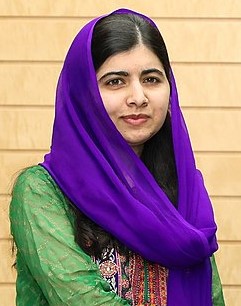Malala Yousafzai

Credit: 内閣官房内閣広報室
Licence: Creative Commons Attribution 4.0 International, Government of Japan Standard Terms of Use (Ver.2.0), via Wikimedia Commons
13:50, 24 March 2019
| Giver: | Individual |
|---|---|
| Receiver: | Individual or unstructured/informal group |
| Gift: | Voice/Advocacy |
| Approach: | Philanthropy |
| Issues: | 4. Quality Education, 5. Gender Equality |
| Included in: | Social Activism |
Malala Yousafzai — known globally as Malala — is a Pakistani activist for girls’ education and the youngest Nobel Peace Prize laureate in history. Yousafzai has become an international symbol of the fight for gender equality in education since she survived an assassination attempt by the Tehrik-i-Taliban Pakistan (TTP; Taliban Movement of Pakistan) in 2012, when she was just fifteen years old. Having risked her life by speaking out against an extremist religious prohibition against girls attending school, Yousafzai now organizes, advocates and amplifies other voices through the Malala Fund, a non-profit organization dedicated to removing barriers to education for 130 million of girls around the world.
Yousafzai was born in 1997 in Mingora, the largest city in the Swat Valley of northern Pakistan. An avid learner, she became passionate about girls’ rights to education at an early age. She also received valuable encouragement from her father, a progressive schoolteacher and local activist.
In 2007 the TTP took control of Mingora and imposed a de facto state of Sharia (fundamentalist religious) Law, banning television and music while shutting down and ultimately destroying girls’ schools. Still a child, Yousafzai began to challenge the TTP edict against girls’ education through local media interviews. She also voiced her opposition in the New York Times documentary “Class Dismissed: Malala’s Story” (2009), and in a blog for the BBC Urdu Service, which she began in 2009 under the pen name Gul Makai.
As Yousafzai gained media exposure she became a target for TTP militants. In 2012 two gunmen accosted her and shot her in the head at close range. Yousafzai received life-saving treatment in Pakistan and subsequently in England. International coverage of the attempt on her life sparked an outpouring of support from well-wishers around the world who commended her courage and urged her not to be silenced. Galvanized by the overwhelming response to her story, Yousafzai resolved to continue her crusade for girls’ education at the global level.
In 2013 Yousafzai established the Malala Fund, which invests in education advocates across the globe — including in Afghanistan, Brazil, Ethiopia, India, Lebanon, Nigeria, Pakistan and Turkey — who are working at the local level to change the policies and social norms that prevent girls from attending school. The organization also supports youth education activists, giving them the tools they need to make their voices heard in their own communities and beyond.
Even as she has become an iconic figure and received extraordinary accolades, Yousafzai insists that her story is important precisely because it is so common. As she said in her Nobel Peace Prize acceptance speech in 2013: “I tell my story, not because it is unique, but because it is not. It is the story of many girls.”
Contributors: Maha Tazi, Erin Brown
| Source type | Full citation | Link (DOI or URL) |
|---|---|---|
| Book |
Yousafzai, Malala; Lamb, Christina. I Am Malala – The Girl Who Stood up For Education and was Shot by the Taliban, Little, Brown Books for Young Readers, 2013. |
ISBN-13: 9780316322409 |
| Book |
Yousafzai, Malala; McCormick, Patricia, I Am Malala – How One Girl Stood up For Education and Changed the World, Little, Brown Books for Young Readers, 2016. |
ISBN-13: 9780316327916 |
| Book |
Yousafzai, Malala, We Are Displaced: My Journey and Stories from Refugee Girls Around the World, Little, Brown Books for Young Readers, 2019. |
ISBN-13: 9780316523646 |
| Book |
Yousafzai, Malala, Malala’s Magic Pencil, Little, Brown Books for Young Readers, 2017. |
ISBN-13: 9780316319577 |
| Book |
Yousafzai, Malala; McCormick, Patricia, Malala – My Story of Standing up for Girls’ Rights, Hachette Children Group, 2018. |
ISBN: 1526361590 |